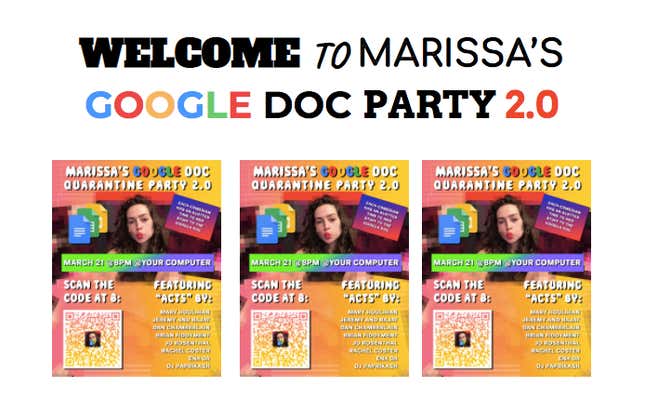Fear is a powerful motivator—but so is boredom. Unleash a global pandemic, plus a wave of lockdowns that keep people cooped up in their homes all day, and you’ll create a potent cocktail of boredom and fear. It’s a mix of emotions powerful enough to transform a Google Doc from a bland productivity tool into a performance art space.
Even before coronavirus, the crushing ennui of the classroom had led savvy teens to turn the ubiquitous word processor into an undetectable messaging app. Imaginative uses of Google Docs haven’t been entirely frivolous either: Wyoming Republicans used them to stage discussions and count votes during a remote caucus, and the UN briefly used a shared document to solicit art that would help spread public health messages. (The response was so overwhelming they had to move to a different platform.)
But within days of authorities issuing shelter-in-place orders, netizens had also turned Google Docs into an escape room, a stand-up comedy venue, and a collaborative puzzle factory.
🎧 For more, listen to the Quartz Obsession podcast episode on Google docs. Or subscribe via: Apple Podcasts | Spotify | Google | Stitcher.
A virtual escape
Brooklynite Anthony Smith released the first part of his Google Docs escape room within 24 hours of New York City mayor Bill de Blasio calling for a citywide shelter-in-place order.
The game, which takes place entirely within the Google Docs ecosystem, is dark, disorienting, and centers on an intense desire to go outside—mirroring millions of people’s current reality. Players navigate the room by clicking links scattered across dozens of interconnected documents in a choose-your-own-adventure-style puzzle.
Smith said he built the game in Google Docs in part because “it’s maybe the only software I know how to use” and he hoped to inspire other people to build their own games out of familiar parts. But, he added, the shared documents are “inherently collaborative, and you can see other people looking at the thing you’re looking at, and I thought maybe that’ll make people feel a little more connected right now.”
Case in point: When Smith accidentally left editing permissions for one of the documents open to anyone, players quickly flooded it with their own messages, creating a 60-page guestbook of well wishes from around the world and cryptic clues for commenters stuck at different points in the puzzle. “I am really touched that people weren’t mean, despite the fact that everyone had anonymity,” Smith said. “That genuinely warmed my heart.”
You can begin Part 1 of the puzzle here. Smith promises that the second part will soon follow.
Coronavirus comedy
Two days after Smith put out his escape room, comedian Marissa Goldman debuted MARISSA’S GOOGLE DOC PARTY, a weekly comedy show that brings comics from The Onion, Reductress, Jimmy Fallon’s The Tonight Show, and elsewhere into one shared doc.

“We spend almost every night telling jokes to humans in the flesh, so there’s definitely a void for a lot of us right now,” Goldman told TimeOut. “I thought, ‘What if we just had comics add things to a Google Doc? That’s kinda fun and weird, right?’ And it all kinda snowballed from there. It was going to just be my friends, but as it turns out, a lot of people had nothing to do.”
The show is best experienced via a YouTube livestream, where viewers can watch comics drop gifs, memes, riddles, and fake promotional videos for a Master Class with the man who writes Joe Exotic’s songs into the Google Doc. The comedians appear in a video box in the corner of the screen, where they crack jokes and riff on a stream of audience comments left in a live chat below. Goldman says performing in this format, without immediate feedback from a live crowd, has led comics to take more chances.
“It can make you do riskier things that you wouldn’t necessarily try in real life because if you can see there’s a bad response then you would stop,” Goldman said. But performing via Google Doc, “you can maybe lean into something that isn’t working but discover something new.”
Viewers can pop into the document—and watch the accompanying livestream—at 8pm ET on Saturday nights. The show is taking a break tonight (April 4) but will be back on next week.
Collaborative crosswords
When the Akron Art Museum in Ohio shut its doors on March 14, senior experience officer Seema Rao began circulating a Google Doc to peers at other shuttered museums to start building puzzles based on their collections. Each institution submits one clue, based on an artifact in its digital archives, to form a crossword that doubles as a compendium of museum knowledge.
This week’s puzzle features clues from the Adler Planetarium in Chicago, Eastern State Penitentiary in Philadelphia, the Canadian War Museum in Ottawa, the International Printing Museum in Carson, California, the Pueblo Grande Museum in Phoenix, and dozens of others. “I’ve worked in museums for a very long time and we’re getting submissions from so many museums I haven’t heard of, and a lot of little museums I always want people to hear about,” Rao said.
The crosswords come out each week on Sundays. The museums also collaborate on Sudoku puzzles, with clues rooted in significant numbers from their collections. Rao said the group of curators will soon begin experimenting with other forms of puzzles, too, and share them on social media under the hashtag #MuseumGames.
“A lot of people think of museums as being kind of slow to change, and I think this has shown how museums are really wanting to respond and be with our visitors,” Rao said. “We talk about teaching and learning and those are also really important, but being a comfort and a respite is incredibly important and will be even more important in the future.”
